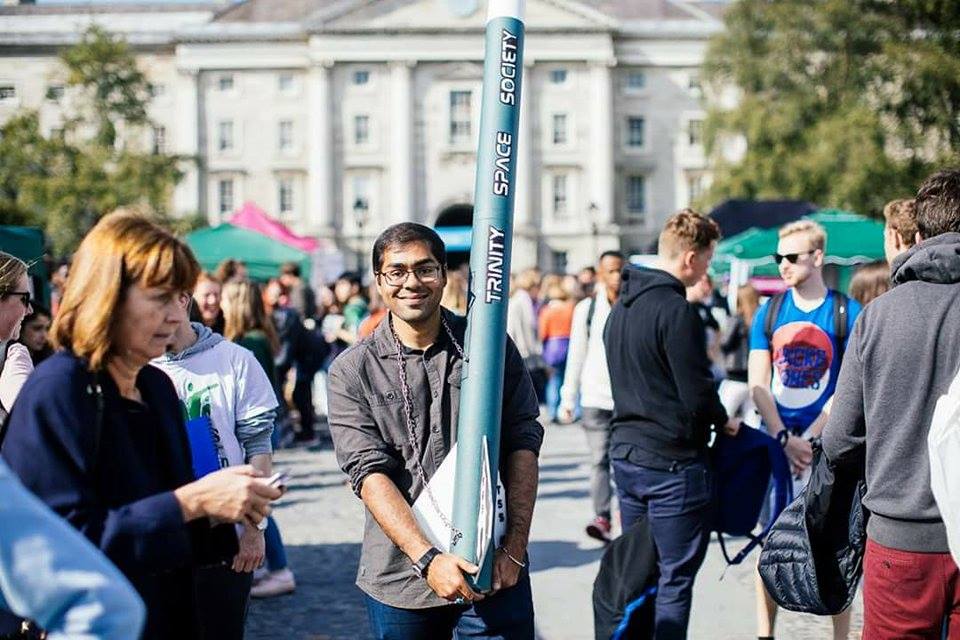
This week is Space Week: the national week of celebration for our world and space, and Trinity Space Society has a week jam-packed full of events for those interested in taking part. Space Week invites casual hobbyists and professionals of anything to do with astronomy to come together in celebration of anything to do with space and all of its mystery and wonder. Space Week is running from October 4th to 10th this year.
One of the Central Societies Committee’s (CSC) latest members, Trinity Space Society spoke to The University Times about their society, their plans for the year ahead as well as their plans for Space Week and their much-awaited rocket launch. Ian Finnegan, the society’s Rocketry Officer, spoke to The University Times and shared some insight into what can be expected from the Trinity Space Society this week.
Trinity Space Society became officially recognised by the CSC only last November. Finnegan described it as “a society whose core ideals are to promote student interest and activity in all aspects of space science, technology and exploration”. The society aims to create a solid community of students who share a common interest in the space industry, exploration and its associated technology, as well as providing regular space-related education, entertainment and events, and also hands-on education opportunities.
Trinity Space Society typically hold two or three events per week, including their weekly lunch event held every Monday at 12pm to 2pm called “Cosmos Coffee”. At their weekly Cosmos Café, Trinity Space Society screen an episode of Carl Sagan’s Cosmos and provide tea, coffee, biscuits and cake. Seeing as it’s Space Week, the society have lined up a panel discussion on Thursday 5th October in Room 3074 in the Arts Block in conjunction with the Zoological Society (ZooSoc). The topic of the panel discussion will be “Life in Space”, and will feature Kate Finucane from the Trinity Space Society, Daniel Dunleavy from ZooSoc, Dr Ernst De Mooij from Dublin City University whose speciality is the habitability of exoplanet atmospheres, and Prof Arthur Wallace from NUI Galway whose speciality is evolutionary biology.
This week, Trinity Space Society will also be screening The Farthest on Friday October 6th, a movie dedicated to the Voyager Mission and which became the first human-made object to reach interstellar space. The documentary was also made by Irish film maker Emer Reynolds.
This weekend, the Trinity Space Society’s rocket, the Spáslong Tríonóide Danu, will be taking its maiden voyage as it’s launched from Birr. Named after the Irish goddess of knowledge and wisdom, the rocket will be launched on Saturday 7th October at 12pm. The Spáslong Tríonóide Danu will be launched in competition with a rocket built by University College Cork (UCC). The launch will be done in association with and under the guidance of Colin Fitzsimons from the Irish Rocketry Society.
Following the launch there will be a tours of the brand new Low Frequency Array (LOFAR) Radio Telescope and a visit to the Leviathan Telescope, along with access to the Birr Castle gardens and science gallery for a total price of €7.
After the excitement of Space Week, Trinity Space Society will settle back into their regular routine of their Cosmos Café event on Monday. Upcoming events for the society include a talk from their secretary Molly McCrory titled “A History of Space”. The following week, on Wednesday 18th October, they’ll be hosting a “Water Bottle Rocketry Space Race” between Trinity’s American Football team and the Trinity Russian Society.
Finnegan finishes the interview with a quote from Sagan: “The nitrogen in our DNA, the calcium in our teeth, the iron in our blood, the carbon in our apple pies were made in the interiors of collapsing stars. The cosmos is within us. We are made of star-stuff. We are a way for the universe to know itself.” Finnegan encourages anyone with an interest in space science, technology or exploration to come along to one of their weekly events in order to get the feel for the society and their passion for what they do.






